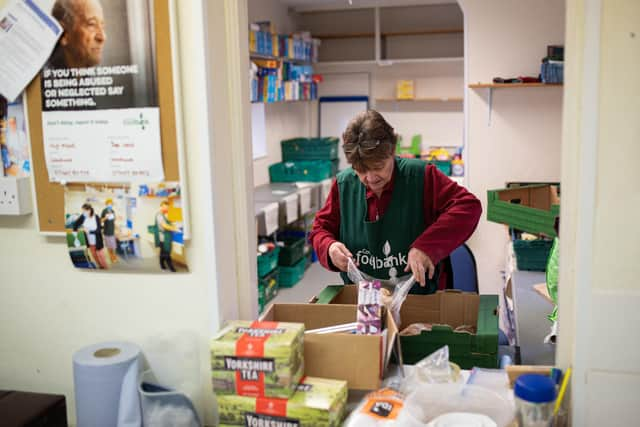Cost of living crisis: Scots are cutting back on food and working longer hours, but are still worse off than the rest of the UK – Mubin Haq, Financial Fairness Trust
Across the country, people told us they are going to great lengths to cut their costs – reducing their use of heating, the oven, even taking fewer showers. Yet still millions are facing higher bills. People in Scotland, as in the rest of the UK, are anxious.
They can see bills continuing to rise across mortgages, rents, food and energy and, for the vast majority, they do not expect their pay to increase in line with inflation. Real-terms earnings are forecast to fall by 5.2 per cent in Scotland in 2022/23 and are not expected to rise higher than 2016 levels until at least 2026/27. And let’s not forget we have already had over a decade of stagnating wages.
Advertisement
Hide AdAdvertisement
Hide AdOur latest Financial Fairness Tracker with the University of Bristol finds the rising cost of living is having a material impact on the quality of life for many in Scotland. People are finding it harder to keep their home warm (reported by 53 per cent of working-age households); eating lower quality food (46 per cent); and feeling less able to socialise (38 per cent). On all of these measures, Scots are faring worse than families in the rest of the UK and in many cases by a considerable margin.
These impacts, which particularly affect lower income families, are worrying given that life expectancy between people living in the most and least deprived areas has widened. In addition, projections of how long people will live in Scotland have been falling. A person born in 2012 is now expected to live to 86 years, 4.4 fewer years than expected a decade ago
Increasing anxiety about money
Unsurprisingly around half of working-age Scottish families feel they have no control over their financial situation and a third are very worried about their finances over the next 12 months. In relation to a range of costs, such as energy bills, food costs, running a vehicle, Scots were more likely to be worried than families in the rest of the UK. The exception to this relates to housing costs where the anxiety levels were the same as the rest of the country. This is likely to be due to lower housing costs in Scotland and a smaller private rented sector.
In these desperate times, people told us they are turning to desperate measures. We see it in the numbers of people using high-cost lenders and food banks, and the increasing use of pawnbrokers. Many are also trying to boost their income: one-in-three are working more hours, while one-in-ten have taken on a second job. A quarter have tried to secure a pay rise or promotion; over half were successful.


Debt traps
Whilst many are therefore trying to increase their incomes or cut back on expenditure, some costs are difficult to surmount. Around 60 per cent describe their energy bills as unaffordable, despite the measures brought in by the UK Government, suggesting that this support falls far short of the help many need. As people struggle to pay their bills, payments start to be missed. Some 30 per cent of households in Scotland report being behind on at least one bill payment. This is leading to more problems.
Community groups working with the charity Debt Justice are reporting an increased use of debt collectors by local authorities as people fall behind on their bills. Campaigners have been warning of an increase in those forced to install pre-payment meters for their energy for months, condemning them to higher tariffs than those available to people who pay by direct debit. Courts are now acting to prevent energy companies from taking such action, but for many, it is too late. Citizens Advice Scotland reported a massive increase in self-disconnections (where people are unable to top-up their prepayment meters) between 2021 and 2022.
What can government do?
In the short-term, government needs to ensure it is supporting those at the sharp end of the cost-of-living crisis. The recent tax rises hit us all, but those on lower incomes could have been spared a lot of pain if the Chancellor had increased tax rates rather than freezing allowances in November. However, it should be recognised that the promise was kept to increase social security in line with inflation which was a huge relief. Measures from the Scottish Government, such as the Fuel Insecurity Fund and the temporary moratorium on evictions, as well as rent caps, will be providing some support.
Our data suggests that additional Scottish Government support for families with children could be making a difference to their financial well-being, but further analysis is needed before we are able to make a clear judgment on the impact of support measures such as the Scottish Child Payment. We hope to be able to undertake that analysis soon, but the latter is a significant increase for low-income families. It’s vital that the Scottish Government increases the child payment in line with inflation from April so that it maintains its real-terms value.
Advertisement
Hide AdAdvertisement
Hide AdIn the longer term, the holes in our social security safety net need to be fixed. Scotland has seen annual cuts from social security budgets of £3.7 billion per year as a result of UK Government welfare cuts over the past decade. While the child payment is an excellent first step, the Scottish Government must go further and follow through on its commitment to a minimum income guarantee.
Ultimately this would ensure everyone has enough for a dignified life through a combination of employment, tax relief, social security benefits and also key services, such as childcare and transport. This will help deliver the financial security that so many need.
Mubin Haq is chief executive of abrdn Financial Fairness Trust
Comments
Want to join the conversation? Please or to comment on this article.